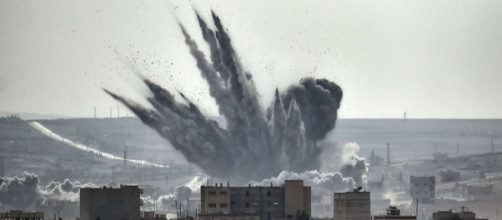Several months after the last chemical weapon attack hit the Syrian city of Idlib, US intelligence officials say that they have detected chemical warfare personnel travelling to production facilities.
Late Monday evening, White House officials warned the Assad Regime that it would pay a "heavy price" if it were to once again use chemical weapons against the people of Syria. This is the first time that the new Trump administration has accused the Assad regime of being able and willing to launch new chemical weapon attacks.
Sources from the Pentagon have told reporters that much of the activity is centered on an aircraft hangar at the central Shayrat air base.
The Shayrat airbase is the same airbase that US President Donald Trump ordered a strike against in April following the Assad regime's last chemical weapons attack.
Syria's Chemical Weapons and US Response
The Assad regime was supposed to hand over its chemical weapon stockpile to international inspectors after they launched a Chemical Attack on a Damascus suburb in 2013. However, many assumed that Syria had held on to the bulk of its stockpile, leading a European diplomat to say that the fact Syria had kept much of its chemical arsenal was "one of the worst kept secrets of international diplomacy."
Since the attack in 2013, the Assad regime has been accused of using chlorine gas to kill hundreds of its own civilians on numerous occasions.
In April of 2017, the regime used sarin gas to launch a chemical attack on Khan Shaykhun, a town located in Syria's Idlib govornate; the attack killed 74 people and wounded over 550.
Less than a week before the chemical attack in Idlib, US President Donald Trump claimed that US policy toward Syria would be to back the Assad regime in an attempt to build a stronger coalition against ISIL. Trump's reassurance that he would back the Russian-backed Assad regime in Syria was criticized by many in the US, with Senator John McCain calling it a "Faustian bargain with Assad and Putin sealed with an empty promise of counter-terrorism cooperation."
After the chemical attack, however, Trump switched camps and claimed that Assad must go.
He used the chemical attack as his reasoning for this, saying that Assad had crossed, "many, many lines."
Donald Trump ended up responding to the chemical attack militarily, ordering the US military to fire over 50 tomahawk missiles at the Syrian airbase from which the planes carrying the sarin gas where launched.
With another possible chemical weapon attack possible, the United States is trying to turn up the pressure on the Assad regime, warning of a heavy penalty if they go through with the attack.
“As we have previously stated, the United States is in Syria to eliminate the Islamic State of Iraq and Syria,” Sean Spicer, White House Press Secretary, said in a statement. “If, however, Mr. Assad conducts another mass murder attack using chemical weapons, he and his military will pay a heavy price.”
The statement comes little over a week after a US pilot shot a Syrian fighter jet out of the sky after the Syrian jet bombed a US-backed rebel group.
Russia has dismissed the White House statement, calling any American threats against Syria "unacceptable." Russian officials have also questioned the legitimacy of the intelligence.
"I am not aware of any information about a threat that chemical weapons can be used," Kremlin spokesman Dmitry Peskov told reporters Tuesday.
Russia has been Syria's main ally in this civil war, launching deadly airstrikes against mainly civilian populations on behalf of the Assad regime.
Many worry that any direct US engagement in Syria against the Assad regime may trigger military conflict with Russia.


